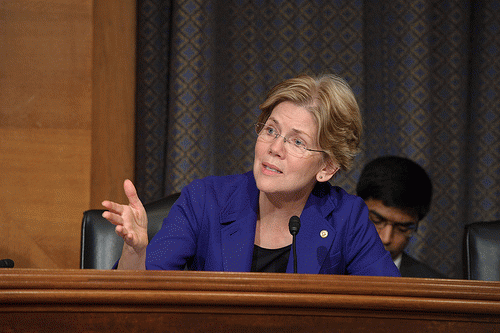FIVE YEARS have passed since the financial crisis, but we all remember its darkest days. Credit dried up. The stock market cratered. There were legitimate fears that the dominos of our financial system would never stop falling.
The crash happened quickly and dramatically, and it caught our nation and apparently even our regulators by surprise. But the causes of the crisis were years in the making, and the warning signs were everywhere.
On many of these fronts, we've made real progress. The Dodd-Frank Act was the strongest financial reform law in three generations, and it gave regulators a number of common-sense tools to prevent future crises.
Dodd-Frank also put in place the new Consumer Financial Protection Bureau, which has made serious strides toward leveling the playing field for families and increasing transparency in the marketplace.
But no law is perfect, and our work isn't done. We need to take more steps to eliminate the "too big to fail'' problem - the problem posed by financial institutions that are so large that their failure would threaten the entire economy.
After the 2008 crisis, there was widespread recognition that "too big to fail'' had distorted the marketplace, creating lower borrowing costs for the largest institutions and competitive disadvantages for smaller ones. The risks posed by moral hazard and the dangers of big banks getting a free, unwritten, government-guaranteed insurance policy were widely acknowledged.
But the problem has not disappeared. Instead, the four biggest banks are 30 percent larger today than they were five years ago. One study earlier this year showed that their "too big to fail'' status enables the 10 biggest US banks to receive an annual taxpayer subsidy of $83 billion.
What are we doing about it? More delays. Many say Congress should wait to act further because the agencies still have to issue many of the rules required by Dodd-Frank. It is true many rules are not yet written, but that's because the agencies have missed more than 60 percent of Dodd-Frank's rule-making deadlines.
When Congress sets deadlines and regulators miss most of them, Congress needs to step in. The last thing we should do is wait for another crisis before we take action.
For that reason, I partnered with Senators John McCain, Maria Cantwell, and Angus King to offer up one potential way to address the "too big to fail'' problem: the 21st Century Glass-Steagall Act.
By separating traditional depository banks from riskier financial institutions, the 1933 version of Glass-Steagall laid the groundwork for half a century of financial stability that helped create a robust and thriving middle class. But regulators and Congress began chipping away at Glass-Steagall in the 1980s, and its core provisions were repealed in 1999.
The 21st Century Glass-Steagall Act would reduce risk in the system and dismantle the behemoths, helping to ensure they are not too big to fail -- or, for that matter, too big to manage, too big to regulate, too big for trial, or too big for jail.
We should not accept a financial system that allows the biggest banks to emerge from a crisis in record-setting shape while ordinary Americans continue to struggle. We should not accept a regulatory system that is so besieged by lobbyists for the big banks that it takes years to deliver rules that are too often watered-down and ineffective.
We should never forget the consequences of letting financial behemoths hold our economy hostage. Exactly five years ago, our economy seemed to be hurtling toward another Great Depression. We managed to avoid that grim fate, but our economy still suffered a staggering body-blow.
A recent report by the Federal Reserve Bank of Dallas estimated that the financial crisis cost us upward of $14 trillion. That's $120,000 for every American household -- more than two years' worth of income for the average family. Millions of workers lost their jobs and their sense of financial security. Billions of dollars in retirement savings disappeared. Entire communities were devastated. The crash of 2008 changed lives forever.
(Note: You can view every article as one long page if you sign up as an Advocate Member, or higher).






